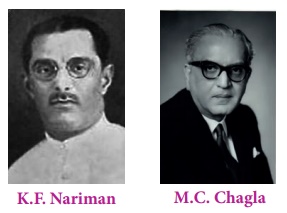Period of Radicalism in Anti-imperialist Struggles | History - Meerut Conspiracy Case, 1929 | 12th History : Chapter 5 : Period of Radicalism in Anti-imperialist Struggles
Chapter: 12th History : Chapter 5 : Period of Radicalism in Anti-imperialist Struggles
Meerut Conspiracy Case, 1929
Meerut Conspiracy Case, 1929
Communist Activities
The
Meerut Conspiracy Case of 1929, was, perhaps, the most famous of all the
communist conspiracy cases instituted by the British Government. The late 1920s
witnessed a number of labour upsurges and this period of unrest extended into
the decade of the Great Depression (1929–1939). Trade unionism spread over to
many urban centres and organised labour strikes. The communists played a
prominent role in organising the working class throughout this period. The
Kharagpur Railway workshop strikes in February and September 1927, the Liluah
Rail workshop strike between January and July 1928, the Calcutta scavengers’
strike in 1928, the several strikes in the jute mills in Bengal during
July-August 1929, the strike at the Golden Rock workshop of the South Indian
Railway, Tiruchirappalli, in July 1928, the textile workers’ strike in Bombay
in April 1928 are some of the strikes that deserve mention.
Government Repression
Alarmed
by this wave of strikes and the spread of communist activities, the British
Government brought two draconian Acts - the Trade Disputes Act, 1928 and the
Public Safety Bill, 1928. These Acts armed the government with powers to
curtail civil liberties in general and suppress the trade union activities in
particular. The government was worried about the strong communist influence
among the workers and peasants.
Determined
to wipe out the radical movement, the government resorted to several repressive
measures. They arrested 32 leading activists of the Communist Party, from
different parts of British India like Bombay, Calcutta, Punjab, Poona and
United Provinces. Most of them were trade union activists though not all of
them were members of the Communist Party of India. At least eight of them
belonged to the Indian National Congress. The arrested also included three
British communists-Philip Spratt, Ban Bradley and Lester Hutchinson – who had
been sent by the Communist Party of Great Britain to help build the party in
India. Like those arrested in the Kanpur Conspiracy Case they were charged
under Section 121A of the Indian Penal Code. All the 32 leaders arrested were
brought to Meerut (in United Province then) and jailed. A good deal of
documents that the colonial administration described as ‘subversive material,’
like books, letters, and pamphlets were seized and produced as evidence against
the accused.
The British government conceived of conducting the trial in
Meerut (and not, for instance in Bombay from where a large chunk of the accused
hailed) so that they could get away with the obligations of a jury trial. They
feared a jury trial could create sympathy for the accused.
Trial and Punishment
Meanwhile,
a National Meerut Prisoners’ Defence Committee was formed to coordinate defence
in the case. Famous Indian lawyers like K.F. Nariman and M.C. Chagla appeared
in the court on behalf of the accused. Even national leaders like Gandhi and
Jawaharlal Nehru visited the accused in jail. All these show the importance of
the case in the history of our freedom struggle.

The
Sessions Court in Meerut awarded stringent sentences on 16 January 1933, four
years after the arrests in 1929. 27 were convicted and sentenced to various
duration of transportation. During the trial, the Communists made use of their
defence as a platform for propaganda by making political statements. These were
reported widely in the newspapers and thus lakhs of people came to know about
the communist ideology and the communist activities in India. There were
agitations against the conviction. That three British nationals were also
accused in the case, the case became known internationally too. Most
importantly, even Romain Rolland and Albert Einstein raised their voice in
support of the convicted.
Under the national and international pressure, on appeal, the sentences were considerably reduced in July 1933.
Related Topics